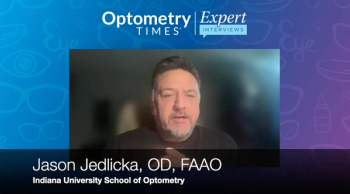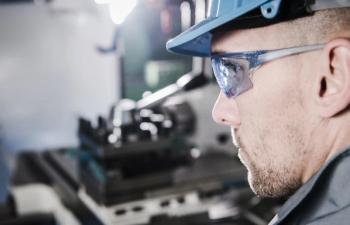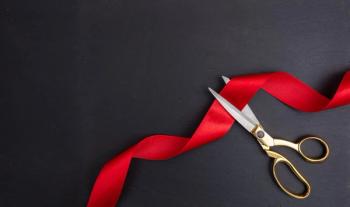
- October digital edition 2022
- Volume 14
- Issue 10
Debunking common ortho-k myths

Eyecare practitioners' top misconceptions just may surprise you.
Chandra Mickles, OD, MS, FAAO, FSLS, the North America professional education lead on myopia with Johnson & Johnson Vision, sat down with Optometry Times® to debunk some of the common orthokeratology (ortho-k) myths.
Before diving into the debunking, Mickles described ortho-k as “a fitting process of specially designed gas permeable lenses” that “reshape the cornea” of a patient’s eye—all while they sleep—promoting correction-free, clear vision.
What are the benefits of ortho-k?
I think most [individuals] think of the freedom, the flexibility, that having correction-free, clear vision provides. But ortho-k does so much more than that. Many studies have shown that it slows the progression of myopia …. Patients who wear [ortho-k lenses] have better vision-related quality of life than patients who wear soft contact lenses and spectacles. [Ortho-k] has also been shown to improve self-esteem. I even hear from parents of children who wear these lenses that one of the great benefits is that they don’t have to worry about their children losing their glasses or breaking them or losing their contact lenses.
What can patients expect from ortho-k?
The biggest [expectation] is having that clear vision. But to be honest, it’s not that they’re going to have it 30 minutes after the exam is over. What we typically expect is, by the next day—depending on how their prescription is—or after a couple of days, their vision will be clear during the day. It does take some time. It’s not like soft lenses: You put them on during the exam, and now you have clear vision. It does take a little time for that shaping to happen.
[Ortho-k] is kind of like a retainer; I use that analogy a lot…. It does take a little time to really shape it and make it semipermanent. But unlike surgery, this isn’t permanent. After you say, “Well, I don’t want to have this anymore,” a patient can stop wearing the lenses and then their eyes go back to their original shape.
What are some common misconceptions of ortho-k that might be keeping doctors from fitting these lenses?
It amazes me that despite these benefits, there are very few doctors who are fitting ortho-k lenses—less than 8% of doctors in the [US] …. The literature shows that the key myths holding them back from fitting are that they believe that parents aren’t interested, they think that ortho-k may not be safe, and they think it is complicated and time consuming.
Is ortho-k safe?
Ortho-k is safe. If you think about anything foreign that you’re putting on the eye—like a contact lens—of course it’s going to increase the risk for infection, but that risk is very low.
If we look at the risk of microbial keratitis [MK], which is what most doctors are concerned about, it is 1 in 5000 patient-wearing years for daily disposable soft contact lenses, and then approximately 1 in 1000 [patient-wearing years] for reusable soft
contact lenses and ortho-k.
Essentially, what that means if I turn that around, is that if a patient wears an ortho-k lens every day for 1000 years, they have 1 chance of probably having [MK] or having an infection. If you think of it that way, that’s a really low risk.
If we just look at children, there are studies—[including] 1 study that I was a part of—looking at children [aged 8 to 12 years]; they have a lower risk of developing infections compared with adults and teens. That’s probably due to better [adherence to] care and wear with a parent’s supervision.
Overall, yes, ortho-k is a very safe contact lens option that doctors should recommend for their patients.
And I think another piece [is] that a lot of times doctors think soft lenses are safer than ortho-k lenses. But when we compare a daily wear of soft reusable lenses and ortho-k [lenses], based on the latest studies, they essentially have the same risk.
And it may be now that even ortho-k has a lower risk of MK than daily wear of soft, reusable contact lenses.
Is ortho-k complicated and time consuming?
There are doctors my age or older—when we think back to being in school—we went through this long process of trial and error of fitting these lenses.
But now, ortho-k fitting has come a long way, where there have been advancements that make it not so complicated [or] time consuming, such as the designs.
There has also been an improvement in the technology that we use to fit the lenses, such as topography. Also, now there is computer-based software available to help with designing the lens. All of this has helped [ortho-k] become not as complicated [or] time consuming as we originally thought when they came out on the market.
Are parents interested?
Yes. And the crazy thing is that when I looked at literature on this—and all of this
is just published this year and in 2021—[uninterested parents are] a top reason holding doctors back.
A few years ago, I was [a] lead investigator on a multicenter study looking at parents’ knowledge and perception of myopia and myopia management. What we found was that 70% of the parents in that study were interested in myopia management; they just need to be educated about it.
And then when we dive in a little further, the top choice of the treatment options for myopia management was ortho-k, which I’m sure [was] surprising for a lot of practitioners. So [parents are] interested, and when I ask my peers, they’re like, “Yeah, Chandra, most of my patients, once I ask them about it, they jump on board, for sure.”
How big a role does education play?
The education is a huge piece. I did an event [recently], where I brought in a parent of a patient, and she’s just surprised that more doctors aren’t sharing with patients and parents about these lenses [and] all the great benefits.
It’s been so helpful for her twin boys who are wearing ortho-k lenses during the evening, and she’s like, “I tell all my friends about it.” I think we just need to do a better job at educating our patients.
Is ortho-k cost-effective?
Yes, it is cost-effective. Considering that parent again, she opened my eyes to something I didn’t always think about. But when you think about it, especially children—and they’re constantly breaking their glasses—then it makes ortho-k a lot more cost-effective. And then if you even compare it to surgery, ortho-k is more cost-effective …. All the benefits outweigh any of the costs. When I think about all the specialty lenses out there, [ortho-k] is right in line with the cost of those lenses, and I think it’s well worth it for sure.
What do you hope our audience takes away from this discussion?
Now [that] we know that ortho-k lenses have all these benefits, I think all doctors—or as many as possible—should jump on the opportunity to utilize these lenses to help their patients. Because their misconceptions aren’t true. Yes, parents are interested, ortho-k is safe, and it isn’t as time consuming or complicated as we originally thought.
Financial disclosure: Chandra Mickles, OD, MS, FAAO, FSLS, is an employee of Johnson & Johnson Vision"
Articles in this issue
about 3 years ago
Making artificial tears less artificialabout 3 years ago
Orthokeratology is key to managing pediatric myopiaabout 3 years ago
Agent improves near vision for irregular corneas with pinhole effectabout 3 years ago
Refractive technologies encompass a rapidly changing landscapeabout 3 years ago
Dacryostenosis illustrates the complexity of treating teary eyesover 3 years ago
Q&A: Exploring telehealth through DigitalOptometricsover 3 years ago
Current glaucoma treatments bring challengesover 3 years ago
Case study: Pigment epithelial detachment is observed, managedNewsletter
Want more insights like this? Subscribe to Optometry Times and get clinical pearls and practice tips delivered straight to your inbox.















































